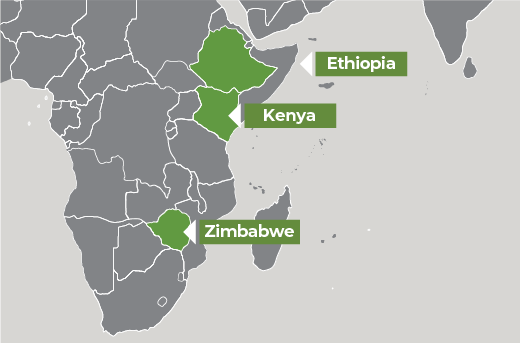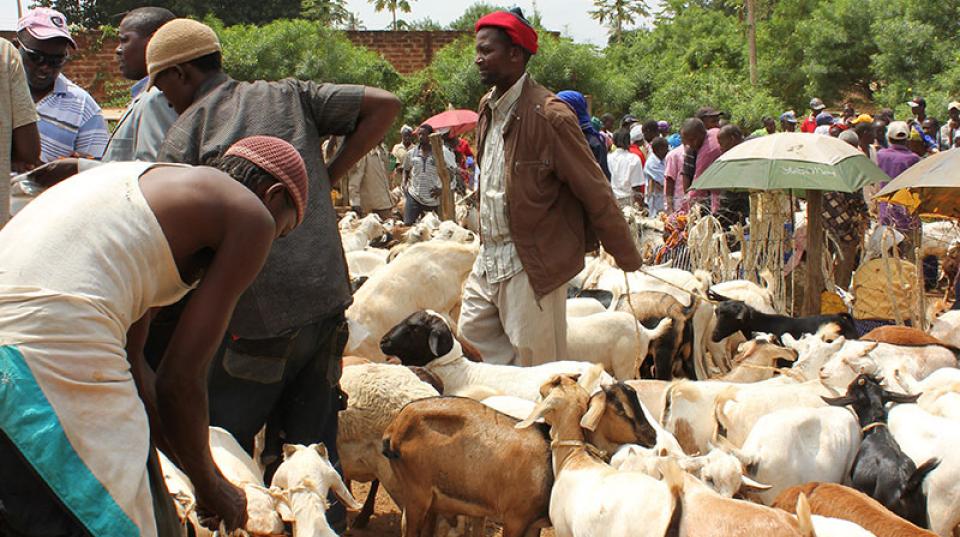Overview
This project aims to support stakeholders engaged in extensive livestock systems in Eastern and Southern Africa to design and implement scalable sustainable interventions that promote adaptive capacity and food and nutrition security of men and women livestock keepers, while reducing greenhouse gas emissions (GHG) from livestock production.
Extensive livestock systems support most of Africa’s livestock population, with 63%, 82% and 70% of the continent’s cattle, sheep and goats, respectively, raised in arid and semi-arid areas of the continent (Gilbert et al. 2018). Despite these large animal numbers, many extensive livestock keepers, including those in Eastern and Southern Africa (ESA), experience low livestock productivity, high variation in production and availability of feedstock, chronic food and nutrition insecurity and economic hardship, which are often exacerbated by climate variability and change (Truebswasser and Flintan 2018, Godde et al. 2020).
In Ethiopia, enhancing food and nutrition security (FNS) and livelihoods through supporting the adaptive capacity of the livestock sector to climate change, and achieving synergies with GHG mitigation are priorities for the country’s medium-term Growth and Transformation Plan (GTP-II). In Kenya, the Agriculture Sector Growth and Transformation Plan (Flagship 6) and the National Agriculture Investment Plan (Anchor 3) prioritise boosting the adaptive capacity of food systems in ASAL regions through increased livestock productivity and marketing. In Zimbabwe, FNS, livestock productivity and animal health are priorities in the Comprehensive Agricultural Policy Framework and are also reflected in the country’s mid-term agriculture investment plans, including the new Agriculture and Food Systems Transformation Plan.
Internationally, the project will contribute to CCAFS’ and AICCRA’s Eastern and Southern Africa program on low-emissions development as well as to the CGIAR’s post-2021 ‘Two Degree Initiative - 2DI’, and the CGIAR’s global big data platform on resilience of rangeland communities.
Expected project outcomes
- Knowledge of the effects of livestock interventions on FNS, adaptive capacity and GHG emissions on extensive livestock keepers; the factors and pathways influencing these effects; and gender and social distribution of these effects
- Knowledge of the synergies and trade-offs between adaptive capacity, FNS and GHG emissions, including the factors affecting the direction and magnitude of synergies or trade-offs
- Knowledge of the effects of targeted gender- and nutrition-sensitive interventions and institutional innovations on increasing synergies and managing trade-offs between adaptive capacity and FNS of extensive livestock keepers, the inclusivity of benefits for different genders or other social groups, and GHG emissions from livestock production
- Understanding the context-specific socio-political, economic, institutional and policy factors that affect design, adoption, effectiveness, scale-up and sustainability of livestock and gender- and nutrition-sensitive interventions at local community and national levels
- Building capacity to determine the type and scope of training and the number of personnel to be trained
- Enabling innovation through equipping and supporting local implementing partners to facilitate livestock keepers to identify, design and adopt locally acceptable food and nutrition- and gender-sensitive interventions
- Equipping national implementing partners to engage stakeholders in dialogue to upscale promising interventions
- Enabling national researchers to provide policy relevant evidence to assist policy makers to plan for upscaling and integrating promising livestock interventions into broader national climate change, livestock and food security sectoral plans.




